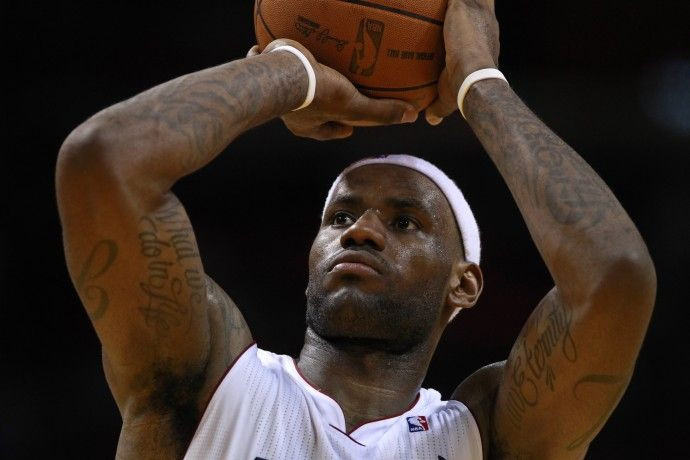Miami Heat: Three Positives to Take from the NBA Finals Game 1 Loss

After trailing for most of the game, the Oklahoma City Thunder beat the Miami Heat 105-94 in Game 1 of the NBA Finals.
OKC didn't take their first lead until late in the third quarter. The Thunder pulled away in the fourth, outscoring the Heat 31-21 in the final period.
Kevin Durant and Russell Westbrook took over in the second half, and carried Oklahoma City for the victory. The tandem outscored the entire Heat team in the last two quarters, scoring 41 points to Miami's 40.
The loss puts Miami in a 0-1 series hole, but the news isn't all bad for the Heat.
Here are some positives that the Heat can take away from their Game 1 loss against the Thunder:
LeBron James
The MVP has been criticized for his failures in the playoffs, but it's really just his play in the NBA Finals that has haunted him. James has had some of the greatest performances in playoff history, including this year's Game 6 against the Celtics, but he has struggled mightily in the last round.
His Cavaliers team was swept in 2007, but they were overmatched by the veteran Spurs. His performance in last year's series against the Dallas Mavericks is perhaps the most puzzling of his career.
After dominating the first three rounds, James became a shell of himself against Dallas. He averaged 17.8 points against the Mavericks, more than 10 fewer points than his career playoff average.
For at least one game, James didn't seem to be affected by playing on the NBA's biggest stage. He scored a Finals' high 30 points on Tuesday, and grabbed nine rebounds, while dishing out four assists.
James didn't have a great fourth quarter, but he scored seven points, which is a big improvement from his previous Finals experience. He scored just 11 total fourth quarter points in the 2011 series against Dallas.
James was bested by OKC's Kevin Durant in Game 1, but he's far from the biggest reason why Miami didn't come away with a victory.
Shane Battier/Mario Chalmers
For one of the few times this postseason, the Heat got decent production from a few members outside of the Big 3.
Battier and Chalmers were an integral part of Miami's dominance in the first half. The two starters combined for 29 points on 11-16 shooting, and accounted for about half of the Heat's first 47 points.
James and Dwyane Wade haven't been shy about passing to Battier in the playoffs, but he hasn't often delivered. Battier is shooting less than 34 percent from the field in the postseason. He's mostly been featured from the three-point line, and hit 4-6 shots from downtown on Tuesday.
Chalmers proved once again that he's not afraid to take big shots. He missed just two of seven attempts, and was very aggressive on offense. Oklahoma City has a big advantage at point guard with Russell Westbrook, and Chalmers did his best to match his counterpart in Game 1.
The series may ultimately come down to the play of James and Wade, but the Heat have no chance if the Big 3 is forced to make every play. Miami has a good chance to win the title if they can get this kind of contribution from Battier and Chalmers each night.
Fast Breaks
Miami got destroyed in transition on Tuesday night. The Thunder outscored the Heat 24-4 in fast break points.
Game 1 showed that the Heat will likely have trouble slowing down the Thunder in this series. Miami looked tired towards the end of the contest, and had trouble getting back on defense against the younger Thunder.
However, such a disparity is an aberration.
OKC is very athletic, but Miami has two of the best athletes in the world in James and Wade. It's hard to believe they'll only average four points in transition for the rest of the series.
The two teams weren't that different in terms of fast break scoring during the season. The Thunder averaged 16.3 transition points per games, while the Heat averaged 13.4.
With Miami's athleticism, it will be almost impossible for Oklahoma City to repeat that kind of performance.
© Copyright IBTimes 2025. All rights reserved.






















